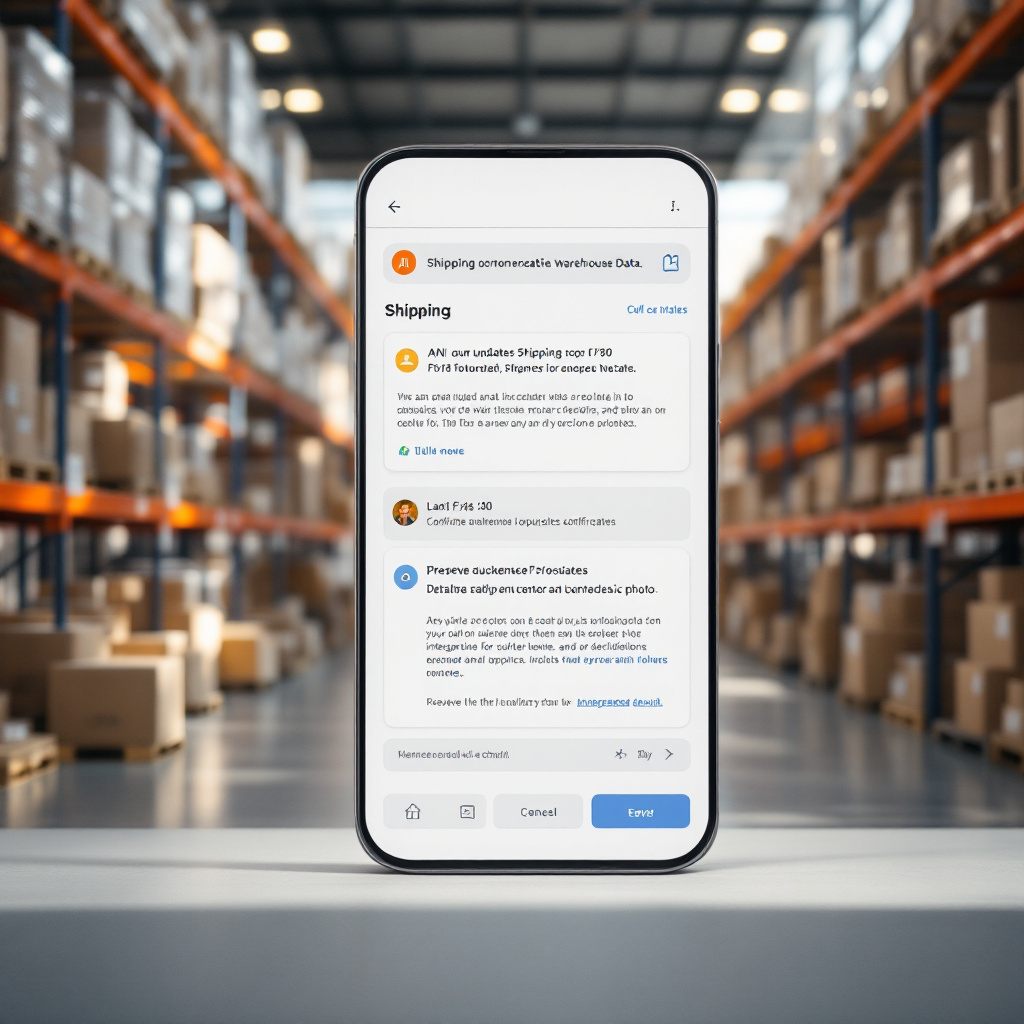Chapter 1: ai in Logistics Email Communication
In the fast-moving logistics industry, communication often determines the success or failure of operations. Coordination between freight providers, customers, and internal teams depends on accurate and timely information sharing. In recent years, AI in logistics email management has emerged as a key solution for accelerating response times and improving message clarity. By using Artificial Intelligence (AI) for drafting, companies are cutting the repetitive manual work tied to daily mail correspondence.
AI-powered systems rely on natural language processing (NLP), machine learning, and integration with operational databases to generate context-specific messages instantly. Order confirmations, shipment updates, customs clearance instructions, and delay reports can now be prepared in seconds instead of manually. This capability significantly boosts the quality of communication while freeing human teams to focus on more strategic activities.
The impact has been measurable. Studies show that implementing AI-driven communications in logistics can lead to a 40% reduction in time spent on routine emails and a 25% boost in customer satisfaction. These systems reduce errors, which are common when messages are prone to errors due to fatigue or high volume. For example, logistics providers can replace bottlenecks in their workflows with AI-assisted email processes.
AI applications in email management can also integrate real-time order status from WMS and TMS platforms directly into outgoing messages. This minimizes delays in tracking email automation and ensures content based on live data. For global logistics firms, multilingual communication is another advantage, enabling effective logistics communication across different markets without language barriers.
As the logistics industry becomes even more data-driven, adopting AI-powered logistics communication solutions is set to become standard practice. This integration of AI into communication in logistics aligns well with supply chain efficiency goals and strengthens proactive communication with stakeholders.

Chapter 2: automate logistics email with ai email assistant
Logistics companies handle thousands of messages daily, from invoices to shipment alerts. Manually creating or replying to each of these emails slows operations and increases the risk of mistakes. When logistics teams automate reply creation with an AI email assistant, they can save time and improve accuracy while keeping customers informed at every stage of the supply chain.
Common use cases for AI in email drafting include order confirmations, shipment updates, delay notifications, and responding to customer inquiries. Research has shown that this can lead to up to a 40% reduction in drafting time and between 35% and 45% less email handling overall (source). Such automation not only saves time but also helps ensure messages meet the professional standards expected in the logistics and transportation sector.
Error rates are another area where AI assistance has proven its value. AI-driven drafting has been linked to a 30% decrease in typos and factual mistakes (source), which directly improves operational reliability. Additionally, personalized messaging using AI increases email open rates by 20% and boosts response rates by 15% (source).
The benefit extends beyond efficiency. AI automation in logistics also supports better customer satisfaction through faster and more consistent communication. Platforms like virtualworkforce.ai reduce manual email handling by integrating multiple data sources into one response system, allowing logistics emails automatically to contain accurate, live shipment data instead of out-of-date information copied from separate systems.
When logistics companies automate these repetitive tasks, staff can focus on managing exceptions and problem-solving, instead of manually drafting every message. This shift enhances the reliability of communication and aligns with the long-term trend toward fully integrated logistics workflows.
Drowning in emails? Here’s your way out
Save hours every day as AI Agents label and draft emails directly in Outlook or Gmail, giving your team more time to focus on high-value work.
Chapter 3: streamline workflow with ai-powered Email Templates
AI-powered email templates have transformed the way logistics teams communicate with customers and partners. Instead of rewriting similar messages multiple times, companies can create a library of templates, each tailored to specific needs such as delivery confirmations or customs clearance updates. The AI tool then uses order data, freight schedules, and customer history to customize these templates, ensuring relevance and accuracy.
Context awareness is a primary benefit here. The assistant can help logistics professionals deliver messages that draw on shipment records, current status, and past customer interactions. This ensures that communication stays personal while being efficient. For global freight operations, multilingual templates streamline communication across borders by automatically generating localized content.
Customizable template libraries allow logistics companies to maintain a consistent voice across all messages, complying with brand standards and regulatory requirements. This approach improves the quality of communication and reduces the risks associated with sending inconsistent or incomplete messages. By using email templates supported by AI, logistics processes remain standardized yet flexible, accommodating the specific needs of different customers or regions.
As seen with platforms like automating logistics email in Microsoft 365, this streamlined workflow cuts repetitive work without losing the human touch. Logistics and transportation businesses can transform their service delivery by providing faster, clearer responses while maintaining personalization. By choosing AI-powered assistants, companies streamline the process, reduce the workload, and improve customer satisfaction metrics consistently.

Chapter 4: integrate ai tool for real-time Shipment and Freight Alerts
One of the most valuable applications of AI in logistics is the ability to integrate AI tools with operational systems to deliver real-time shipment and freight alerts. Integrating AI with WMS, TMS, and CRM platforms creates a seamless flow of data from back-end systems to customer-facing communications. This seamless integration enables automated notifications triggered by live operational events.
For example, a missed pickup or a customs clearance delay can instantly trigger a notification email, informing customers and internal teams without human intervention. This level of proactive communication prevents small issues from escalating and supports smoother logistics workflows. By embedding these alerts into day-to-day systems, operations with AI become faster, more transparent, and less prone to errors.
The benefits for logistics teams include reduced need for manual checks and quicker responses to disruptions. That translates to improved supply chain efficiency and less downtime for both customers and operations. A logistics manager can now focus on resolving issues rather than tracking down status updates.
Integration of AI tools also supports tracking email automation, ensuring that every message reflects accurate, real-time status. Whether for freight forwarding updates or third-party logistics notifications, automated systems build trust by keeping all stakeholders fully informed. With AI-assisted workflows, the industry is moving toward an environment where data-triggered messages enhance customer satisfaction and create measurable operational gains.
Drowning in emails? Here’s your way out
Save hours every day as AI Agents label and draft emails directly in Outlook or Gmail, giving your team more time to focus on high-value work.
Chapter 5: customise automation for improved Customer Satisfaction
Customer satisfaction has always been central to effective logistics operations. AI now enables logistics companies to customize automation in ways that enhance customer satisfaction while increasing efficiency. By using customer profiles and records of past interactions, AI writing systems produce messages tailored to your needs, improving engagement and trust.
One proven strategy is A/B testing of AI-generated templates. Logistics companies can refine tone, content, and send times to match customer expectations more closely. Statistics from industry research show that these efforts can lead to a 25% rise in customer satisfaction scores, as messages are both relevant and timely.
Balancing automation with the human touch is essential. For sensitive communications, AI assistance can generate a first draft emails which staff can then review and adjust. This hybrid model reduces manual work while ensuring content based on company values and customer preferences.
Systems like virtualworkforce.ai offer AI-powered assistants designed for logistics applications, capable of integrating data from multiple systems into every message. This approach not only reduces manual drafting time but also increases the consistency of responses, enhancing the overall quality of communication. By applying AI automation in logistics processes strategically, companies maintain efficiency without losing the personal engagement that customers appreciate.
Chapter 6: application of ai in Logistics Companies and free ai email agents
The application of AI across logistics companies covers both enterprise-scale deployments and solutions for smaller firms. Larger organizations are finding ways to use AI to automate everything from routine updates to complex exception handling. Meanwhile, free or freemium AI email agents are making similar capabilities accessible to smaller logistics providers that have fewer resources. For example, AI service offerings tailored to freight forwarding companies can significantly improve handling times for both incoming emails and outbound updates.
Virtualworkforce.ai offers no-code AI email agents for ops teams, giving them deep data fusion with ERP, TMS, WMS, and other logistics software—allowing them to draft professional emails instantly using live data sources. The tool helps reduce manual email handling and tackle the bottleneck created by high volumes of communications. This is especially beneficial for third-party logistics providers and those dealing with complex logistics arrangements.
As AI adoption grows, the future outlook includes deeper AI automation in logistics, from predictive delay alerts to fully automated customs clearance updates. Integrating AI into everyday logistics workflows will become the norm, with AI applications spanning across customer support, invoice processing, and proactive operations tracking. Free tools might fit smaller organizations, but enterprise-grade AI agents will dominate large-scale operations.
For decision-makers looking to implement AI assistance, the next step involves defining objectives, selecting suitable AI tools, and ensuring proper training and governance. Carefully integrating AI into logistics processes can save time and improve both productivity and customer experience—delivering measurable benefits while preparing companies for the next stage of digital transformation in logistics.
FAQ
What is AI email drafting in logistics?
AI email drafting in logistics refers to using artificial intelligence to create accurate, context-aware messages for customers and partners. It leverages live operations data to ensure every email contains up-to-date shipment and order details.
How does AI improve communication in logistics?
AI enhances communication by reducing manual drafting effort, improving accuracy, and speeding up responses. It also enables personalized interactions that strengthen customer trust.
Can AI reduce errors in logistics emails?
Yes, studies show that AI can reduce typographical and factual mistakes by around 30%. This directly improves the reliability and clarity of operational communication.
What systems can AI email tools integrate with?
AI tools can integrate with WMS, TMS, CRM, and ERP systems. This integration ensures emails are generated with accurate real-time data for greater supply chain transparency.
Is automation suitable for sensitive customer communications?
Automation can be used alongside human review for sensitive messages. AI drafts the email while staff add any necessary personal adjustments.
What are AI email agents?
AI email agents are intelligent assistants that handle drafting and responding to emails based on live operational data. They can automate a large portion of daily email volume for logistics teams.
Do small logistics companies benefit from AI email technology?
Yes, smaller companies can adopt free or low-cost AI email tools to gain similar efficiency benefits as larger firms. These solutions improve communication quality without heavy investment.
How does AI improve customer satisfaction?
By delivering faster, personalized, and more accurate communications, AI helps customers feel informed and valued. This translates into higher satisfaction scores.
Can AI handle multiple languages in emails?
Many AI systems support multilingual communication. This is especially useful for global logistics companies operating across regions and languages.
What’s the future of AI in logistics communication?
The future includes deeper AI automation, broader integrations, and predictive messaging that anticipates issues before they arise. This will further improve supply chain efficiency and customer service.
Ready to revolutionize your workplace?
Achieve more with your existing team with Virtual Workforce.